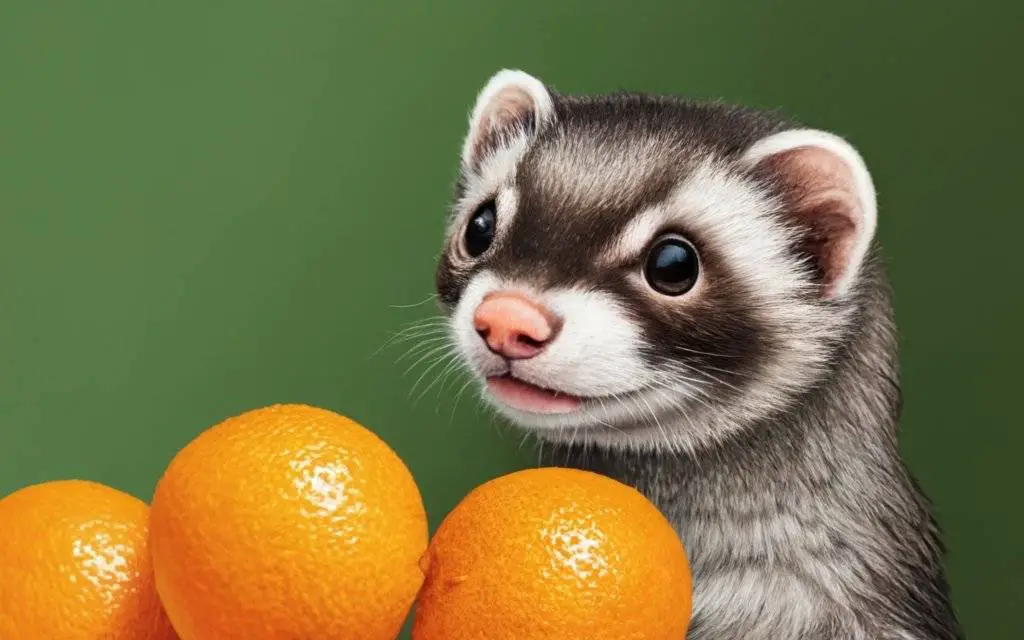When it comes to feeding your beloved pet ferret, it’s crucial to provide them with a well-balanced and suitable diet. Ferrets, as obligate carnivores, primarily thrive on meat. While their main dietary staples should consist of high-quality commercial ferret food or raw meat, you might be curious about whether they can enjoy occasional fruity treats like oranges. In this comprehensive guide, we’ll delve into the question: Can ferrets eat oranges?
Jump To
Can Ferrets Eat Oranges?
Yes, ferrets can indulge in the occasional slice of orange, but it’s vital to exercise moderation. Oranges are not toxic to ferrets, and they can savor a small amount as an infrequent treat. Nevertheless, it’s imperative to bear in mind that oranges are rich in sugar, and a ferret’s dietary intake should be low in sugar.

Nutritional Value of Oranges
Oranges do contain essential vitamins like vitamin C and various nutrients, but they are not an essential component of a ferret’s diet. Ferrets derive their crucial nutrients primarily from animal-based protein sources. Although they can tolerate a tiny bit of fruit on occasion, their digestive systems are not optimized for processing large quantities of fruits or vegetables.
Moderation Is Key
If you opt to offer your ferret a tiny piece of orange, make sure it’s a rare occurrence. Overindulgence in citrus fruit can lead to stomach upset and digestive disturbances in ferrets. Ferrets possess sensitive digestive systems, and abrupt dietary changes can trigger issues.
The Importance of Vitamin C in a Ferret’s Diet
Vitamin C plays a pivotal role in the overall health and well-being of ferrets. Similar to humans, ferrets are incapable of synthesizing this essential vitamin independently and must acquire it through their diet.
Incorporating an adequate amount of vitamin C in your ferret’s diet is vital, as it bolsters their immune system, contributes to collagen production for healthy skin, teeth, and bones, and serves as an antioxidant that safeguards the body against oxidative stress, promoting overall vitality.
Insufficient levels of vitamin C can lead to various health complications in ferrets, such as a weakened immune system, impaired wound healing, and a condition known as scurvy.
Indications of vitamin C deficiency may manifest as lethargy, loss of appetite, swollen joints, bleeding gums, and hair loss. Thus, it is crucial to ensure that your ferret’s diet provides them with the requisite amount of vitamin C to avert these deficiencies.
While some commercial ferret foods are fortified with vitamin C, it is always prudent to consult with your veterinarian to ascertain the appropriate dosage for your ferret and whether any supplements are necessary.
Fruits Suitable for Ferrets
While ferrets predominantly thrive on a carnivorous diet, they can occasionally relish a small assortment of fruits as part of their culinary repertoire. However, not all fruits are suitable for ferrets, and some can even be detrimental to their well-being.
If you’re contemplating introducing fruits into your ferret’s diet, opt for options that are lower in sugar than oranges and possess a high fiber content. These characteristics help mitigate the risk of digestive issues and maintain a balanced diet for your furry companion.
Some fruits that are generally safe for ferrets to consume in moderation include apples, bananas, and various berries. These fruits can be proffered in small portions as occasional treats to diversify their diet.
Always ensure you thoroughly wash the fruits and remove any seeds or pits before serving them to your furry friend.
In summation, ferrets can indeed partake in the occasional orange slice, but it’s prudent to offer them in moderation. Their primary sustenance should revolve around high-quality ferret food and meat-based sources of protein. Vigilantly monitor your ferret for any adverse reactions when introducing new foods into their diet.
Frequently Asked Questions (FAQs)
Can ferrets eat bananas?
Yes, ferrets can savor bananas in small quantities as an occasional treat. However, due to their high sugar content, it’s essential to bestow them sparingly.
Are strawberries safe for ferrets?
Ferrets can relish small portions of strawberries as a treat, but, like other fruits, they should be offered infrequently due to their sugar content.
What constitutes the primary diet of ferrets?
Ferrets are obligate carnivores, which means their primary dietary staples should encompass high-quality commercial ferret food and animal-based protein sources, such as meat.
Is it advisable to provide ferrets with oranges on a daily basis?
No, it’s not advisable to offer ferrets oranges daily due to their high sugar content. Occasional treats in moderation are the safer choice.
Do ferrets require fruits and vegetables in their diet?
Fruits and vegetables are not a necessity in a ferret’s diet. Their nutritional requirements are primarily met through meat-based sources.
Can oranges pose harm to ferrets?
While oranges are not toxic to ferrets, excessive consumption can lead to digestive issues and upset stomachs.
What’s the best approach for introducing new foods into my ferret’s diet?
When introducing new foods to your ferret, proceed gradually and in small amounts to monitor for any adverse reactions or digestive problems.

